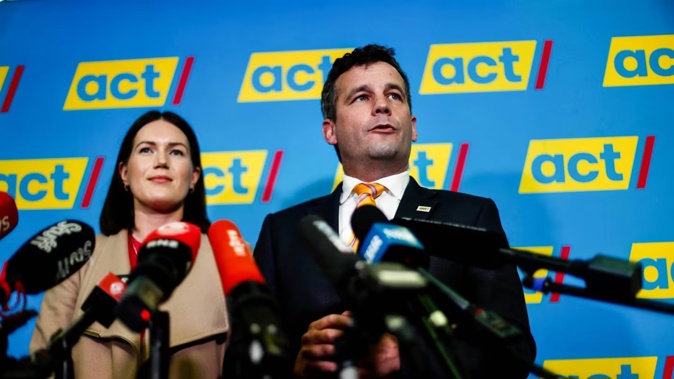
Act will be the only party in Parliament not represented at this year’s Rātana celebrations as leader David Seymour confirms he will continue his run of absences at the annual event.
Rātana, normally a three-day festival considered by some to be the start of the political year, celebrates the Rātana Church’s late founder, Tahupōtiki Wiremu Rātana, on January 25 at Rātana Pā, just south of Whanganui.
The Rātana movement is a church and pan-iwi political movement founded by Rātana in 1925. It has historical links to the Labour Party after its founding prophet formed an alliance with former Prime Minister Michael Joseph Savage in 1936.
Politicians of all stripes are invited to speak on Māori issues while Māori from across the country make clear their views.
Former PM Jacinda Ardern was farewelled during last year's Rātana celebrations after announcing her resignation. Photo / Mark Mitchell
This year’s celebrations will be just days after hui organised by the Kīngitanga this weekend at Tūrangawaewae Marae in Ngāruawāhia for Māori to discuss policies of the new coalition Government regarding te reo Māori and Te Tiriti o Waitangi, including stripping Treaty references from legislation and downplaying the importance of te reo in the public service.
While Rātana is traditionally a peaceful celebration, with politicians urged to keep politics out of speeches, it has a history of being the scene of fiery, and at times humorous, rhetoric.
Last year, then-National leader Christopher Luxon was urged not to be afraid of co-governance, which drew a few chuckles from locals. Luxon spent much of his speech attacking co-governance.
Seymour, who did not attend last year as Act leader, told the Herald today he would not be there this year in his role as minister and coalition leader.
“I’ve always seen Waitangi as the state occasion and the beginning of the political year,” he said.
He described Rātana as an “event hosted by a church” that people were free to attend but that it did not hold the same significance as Waitangi.
Both Luxon and New Zealand First leader Winston Peters will attend, alongside leaders from Labour, the Greens and Te Pāti Māori. All leaders will be provided an opportunity to speak.
Two of the three coalition leaders will be attending Rātana this year. Photo / Mark Mitchell
Seymour acknowledged his run of absences could change in 2026, when he will hold the Deputy Prime Minister role. Peters currently holds the role but is due to hand it over to Seymour in the middle of 2025.
While Act MPs are free to attend, it is expected that none will.
Te Taepa Kameta, spokesman for Rātana tumuaki (president) Manuao Te Kohamutunga Tamou, said it was a decision for Seymour and felt his absence wouldn’t change the kōrero delivered to politicians next Thursday.
He said the presence of Luxon and Peters was sufficient, acknowledging the novelty of a “three-headed taniwha” - a three-party coalition Government, which was a first for New Zealand.
With some parts of Māoridom unhappy with the new Government’s approach to te reo and the Treaty, Kameta said he wasn’t aware of any protests set for next week and hoped this weekend’s hui might help the Rātana celebrations avoid that level of tension.
Asked about the church’s view of the Government’s policies, Kameta said the church supported Kīngi Tūheitia.
Expressing his personal view and not the church’s, Kameta said some policies seemed contrary to what the church had worked towards regarding the use of te reo and upholding Te Tiriti. However, he emphasised the importance of engaging with the new Government to find solutions.
Adam Pearse is a political reporter in the NZ Herald Press Gallery team, based at Parliament. He has worked for NZME since 2018, covering sport and health for the Northern Advocate in Whangārei before moving to the Herald in Auckland, covering Covid-19 and crime.
Take your Radio, Podcasts and Music with you

/cloudfront-ap-southeast-2.images.arcpublishing.com/nzme/NGPSATDUVFGLRCILPFSSCKVT6Q.JPG)
/cloudfront-ap-southeast-2.images.arcpublishing.com/nzme/67E7FOBH6VDAZJMV64BBNDY56I.JPG)








